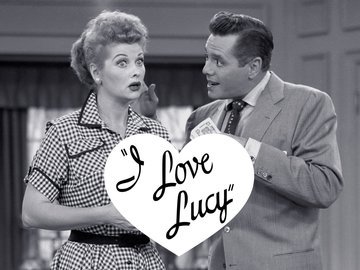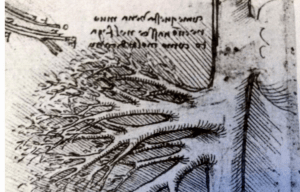Winner of the Fall 2016 StMU History Media Awards for
Best Explanatory Article
Most Captivating/Engaging Article
Best Use of Multiple Images
Best Introductory Paragraph
Best Overall Research
“Lucy, you got some splainin’ to do!” These words were heard by families across America repeatedly in the 1950s. Uttered in a thick Latin accent by none other than Ricky Ricardo, the bongo playing, bandleader, Cuban husband of the flighty, redheaded, Lucy Ricardo on the 1950s television situation comedy, I Love Lucy. This popular television comedy entered the homes of people across America in the years 1951 to 1957. In the six-year span that the show was on the air, it never ranked lower than third nationally among television programs.1 So the question arises: what was it about this show that was so popular among the families in America? The answer to that is simple. I Love Lucy told the tale of a common housewife who dreamed of more than cooking and cleaning; she wanted to be a star. Housewives throughout America related to the character of Lucy Ricardo who longed for more in life, in the period of American history that has been called The Affluent Society.

Lucille Ball was born in Celoron, New York in 1911 to a family who believed that hard work was needed to achieve success. She found work in movies and on the radio, and had a recurring role on the hit CBS radio show, My Favorite Husband.2 Desi Arnaz was born in Santiago de Cuba, Cuba in 1917 to a wealthy family. His father was a politician and landowner and his mother was an heiress. The Revolution of 1932 in Cuba hit the Arnaz family hard, and they were ultimately forced to move to Miami, Florida.3 Arnaz met Ball in 1940. The two immediately connected with one another, and after a five-month whirlwind romance, the couple was married.
However, the marriage was rocky from the start, and it did not help that Ball was forced to stay home due to her acting and radio career, while Arnaz toured with his band. When the director of My Favorite Husband offered Ball the opportunity to take the show to the new medium of television, she jumped at the chance on the one condition that Arnaz be cast for the role of her on-screen husband. Ball was looking for a way to save her marriage, and she believed that working with Arnaz and having him close to home was the way to do it. CBS was hesitant to agree to her request, but they wanted Ball so they decided to film a pilot for the show.4 With her hardworking, no-nonsense family background, Ball was determined to make the show a success. Arnaz and Ball became Lucy and Ricky Ricardo on the immediate hit television show that would run for the next six years.
Family life in the 1950s focused mostly on men working while women stayed home, kept the house, and raised children. Pediatrician Dr. Benjamin Spock published Baby and Child Care, a book that highlighted an approach to raising children that was child-centered as opposed to parent-centered. Dr. Spock viewed the role of the mother as belonging at the center of the household while the husband was the breadwinner and had very little to no interaction in raising children.5 This view began to generate dissatisfaction among women who longed for a more fulfilling life.

I Love Lucy focused on the life of Lucy Ricardo, a ditzy housewife with dreams of fame and fortune, and her Cuban, bandleader husband Ricky. Lucy was far from the typical housewife; she was not satisfied with simply staying home and keeping house while her husband worked or went out with friends. She had quite the imagination and came up with schemes to break into show business, which usually caused tension between her and Ricky. Lucy brought the desires for something more that were locked away in the hearts of housewives across America, and she brought those desires out into the public eye. While she did play her role in an extremely comedic way, she somehow always returned to the dutiful housewife of the 1950s.6

Producers were not sure what the audience would make of Arnaz. He was a television first in many ways; he was the first Hispanic actor welcomed into the homes of the American people on a regular basis. It was the first time many had ever heard a Latino accent, and Arnaz did not fit the typical Hispanic stereotype that most Americans held at that time. Arnaz was handsome, smart, dignified, warm, responsible, employed, loyal, and married. The producers were also concerned about the audience viewing the Ricardo’s marriage as interracial, and this was not something that had ever before been aired openly in movies or on television. Despite these obstacles, Arnaz was treated as an equal white American, and accepted graciously throughout the nation.7

During its six-year reign, I Love Lucy ranked in the top three spots nationally among television programs. Exceptional talent in acting, comedic timing, writing, directing, editing and above all, being relatable, made I Love Lucy an instantaneous success.8 Lucille Ball accepted her role as the zany housewife, Lucy Ricardo, and ran with it. She was not afraid to put herself out there, work hard, and make her dreams come true. Housewives across America finally had a female television star that they were able to relate to; someone who knew there was more to life than cooking and cleaning. With this in mind, maybe, just maybe, they too could stand up and do something more.
- Salem Press Encyclopedia, January 2016, s.v. “I Love Lucy (TV),” by Mary Hurd. ↵
- Salem Press Encyclopedia, January 2016, s.v. “Lucille Ball,” by Richard Adler. ↵
- American National Biography (From Oxford University Press), 2010, s.v. “Desi Arnaz,” by Tinky “Dakota” Weisblat. ↵
- Gigi Anders, “’Luuu-cy!’,” Hispanic 14, no. 11 (November 2001): 44-46. ↵
- Alan Brinkley, American History: Connecting the Past Volume 2, 15 edition (New York: McGraw-Hill Education, 2014), 764. ↵
- Salem Press Encyclopedia, January 2016, s.v. “I Love Lucy (TV),” by Mary Hurd. ↵
- Gigi Anders. “’Luuu-cy!’,” Hispanic 14, no. 11 (November 2001): 43. ↵
- Salem Press Encyclopedia, January 2016, s.v. “I Love Lucy (TV),” by Mary Hurd. ↵



106 comments
Angela Rodriguez
“I Love Lucy” was such an inspirational sitcom to many women during the 1950’s. Growing up, I remember my Grandmother’s would always talk about how they related to this show and how they always waited for the next episode to air. This sitcom just became popular that even their children would watch it alongside them. Women during this time were not given their recognition they deserved and I this article is just one way of expressing the difficulties during this time period.
Crystalrose Quintero
I thought the title was perfect because it took a twist on the title of the show. It was a good change to have opened the article with a captivating quote from the show. Immediately into the first paragraph, the sentences were full of descriptive language that really painted a picture of what the author was trying to get across. I also was not aware that Lucy and Ricky Ricardo were based on real people. I enjoyed that the article didn’t immediately tell you this. Rather, it spoke of these two people and at the end of the paragraph explained the relation.
Valeria Hernandez
Celina Resendez presents the story of the popular American show I Love Lucy, however, I feel that the article does not tell an interesting and capturing story. The lack of details and a climax makes the story a little dry. However, the author’s topic is interesting and she brings up clear relatively accurate points, about women’s feeling during the era possibly drawing a connection past and current issues.
Josselyn Arrieta-Meraz
From beginning to end, eye catching. The fact that women all across America had a show they could relate to, that not only made them feel understood but was a good entertainment, designated for all audiences. The fact that the actress herself went through so much herself really is inspiring not only did she want more, but she was determined to do so. I love the point of view and side the author of this article took in approach to a well written introduction of the main characters, but most importantly the journey and success they all went through.
Belene Cuellar
Of course I’ve heard about I Love Lucy, I just never knew that Lucy and her husband were actually married in real life. The author did a good job in giving background stories to both Lucy and her husband Arnaz. The fact that I Love Lucy had such an impact to women everywhere is also something I didn’t know. There’s something about Lucy that brings me such joy, the fact that she didn’t settle for anything less. She always fought and worked hard for what she wanted. I love the way the author went along with Lucy’s life and the challenges she faced with her marriage.
Megan Barnett
I had no idea that I Love Lucy had such a huge impact on the American culture. I have not seen many episodes, but from what I remember I never noticed that the show did not follow the social norms of that time period. Overall the article was interesting and and continued to keep me intrigued throughout. I liked how not only Lucille’s story was shared, but also her husband’s and how they came to be stars in the show I Love Lucy.
Jazmin Pizana
I love this article! It brings back so many memories of me and my grandmother watching it together when I was little! I never knew that there was much more behind the scenes of “I Love Lucy.” She was such an inspiration during that time period and still is to this day. This a show that will always be loved and appreciated for generations to come.
Cherice Leach
What a great article! You do such a great job on being informational but still keeping the text interesting! I love the content you share on I Love Lucy being something ordinary housewives could relate to. I really think I Love Lucy could be marked as one of the stepping stones that helped woman break out of society’s norms of the woman role in a family.
Christine Sackey
I was thought that Desi Arnaz and Lucille Ball were a cute couple that was in love, but I had no idea that they were fighting for their marriage. Lucille Ball was a talented lady who knew what she wanted and kept pushing for it. For example, how she gave CBS an ultimatum about either they let her husband play her on-screen husband or she would not play the part. Desi Arnaz was also gifted, and I admired how he and his family could create a successful new life. I did not know that Arnaz’s family was wealthy and was forced to move to Florida. Overall I really enjoyed this article.
Amanda Perez
This article was so charming and so informative. I had no idea that the two lead characters were married in real life. That must be why there was such great chemistry. I also found it very warming that Arnaz took a huge step in the right direction for the Latino community. “I Love Lucy” introduced topic that were taboo at one point and made them normal. It promoted the rise of women and Latin Americans.